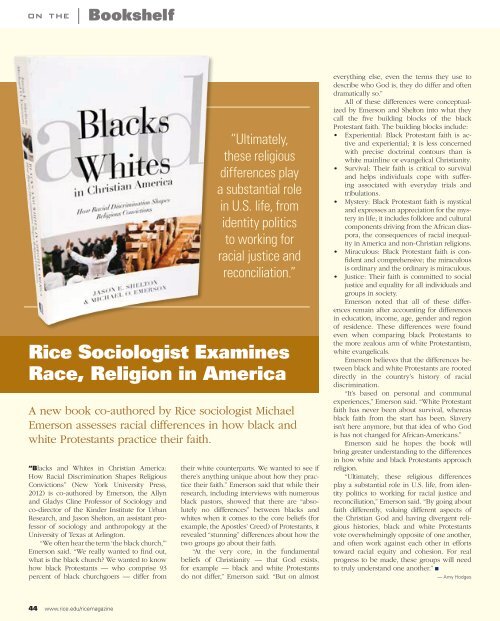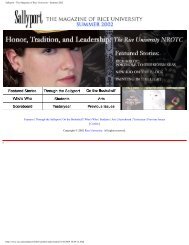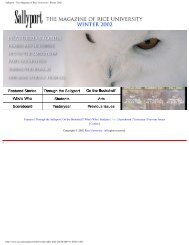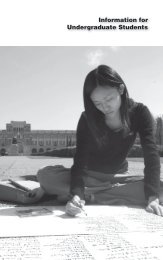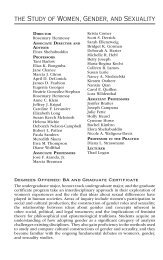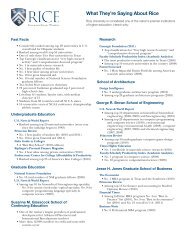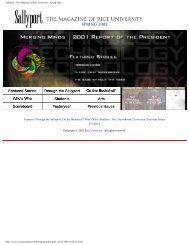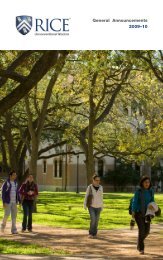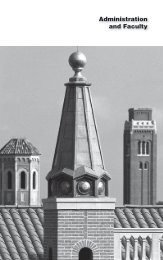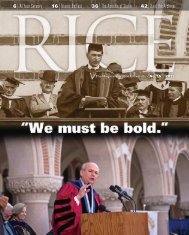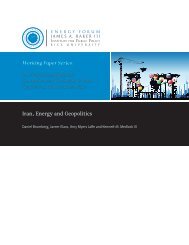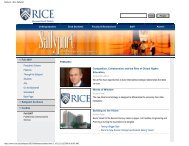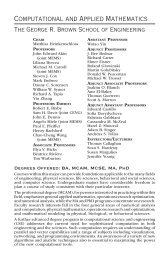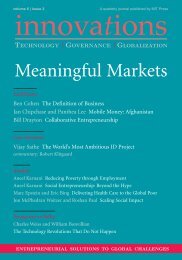6| At Your Servery ⢠16|Titanic Belfast ⢠36|The ... - Rice University
6| At Your Servery ⢠16|Titanic Belfast ⢠36|The ... - Rice University
6| At Your Servery ⢠16|Titanic Belfast ⢠36|The ... - Rice University
Create successful ePaper yourself
Turn your PDF publications into a flip-book with our unique Google optimized e-Paper software.
ON THE<br />
Bookshelf<br />
“Blacks and Whites in Christian America:<br />
How Racial Discrimination Shapes Religious<br />
Convictions” (New York <strong>University</strong> Press,<br />
2012) is co-authored by Emerson, the Allyn<br />
and Gladys Cline Professor of Sociology and<br />
co-director of the Kinder Institute for Urban<br />
Research, and Jason Shelton, an assistant professor<br />
of sociology and anthropology at the<br />
<strong>University</strong> of Texas at Arlington.<br />
“We often hear the term ‘the black church,’”<br />
Emerson said. “We really wanted to find out,<br />
what is the black church? We wanted to know<br />
how black Protestants — who comprise 93<br />
percent of black churchgoers — differ from<br />
“Ultimately,<br />
these religious<br />
differences play<br />
a substantial role<br />
in U.S. life, from<br />
identity politics<br />
to working for<br />
racial justice and<br />
reconciliation.”<br />
<strong>Rice</strong> Sociologist Examines<br />
Race, Religion in America<br />
A new book co-authored by <strong>Rice</strong> sociologist Michael<br />
Emerson assesses racial differences in how black and<br />
white Protestants practice their faith.<br />
their white counterparts. We wanted to see if<br />
there’s anything unique about how they practice<br />
their faith.” Emerson said that while their<br />
research, including interviews with numerous<br />
black pastors, showed that there are “absolutely<br />
no differences” between blacks and<br />
whites when it comes to the core beliefs (for<br />
example, the Apostles’ Creed) of Protestants, it<br />
revealed “stunning” differences about how the<br />
two groups go about their faith.<br />
“<strong>At</strong> the very core, in the fundamental<br />
beliefs of Christianity — that God exists,<br />
for example — black and white Protestants<br />
do not differ,” Emerson said. “But on almost<br />
everything else, even the terms they use to<br />
describe who God is, they do differ and often<br />
dramatically so.”<br />
All of these differences were conceptualized<br />
by Emerson and Shelton into what they<br />
call the five building blocks of the black<br />
Protestant faith. The building blocks include:<br />
• Experiential: Black Protestant faith is active<br />
and experiential; it is less concerned<br />
with precise doctrinal contours than is<br />
white mainline or evangelical Christianity.<br />
• Survival: Their faith is critical to survival<br />
and helps individuals cope with suffering<br />
associated with everyday trials and<br />
tribulations.<br />
• Mystery: Black Protestant faith is mystical<br />
and expresses an appreciation for the mystery<br />
in life; it includes folklore and cultural<br />
components driving from the African diaspora,<br />
the consequences of racial inequality<br />
in America and non-Christian religions.<br />
• Miraculous: Black Protestant faith is confident<br />
and comprehensive; the miraculous<br />
is ordinary and the ordinary is miraculous.<br />
• Justice: Their faith is committed to social<br />
justice and equality for all individuals and<br />
groups in society.<br />
Emerson noted that all of these differences<br />
remain after accounting for differences<br />
in education, income, age, gender and region<br />
of residence. These differences were found<br />
even when comparing black Protestants to<br />
the more zealous arm of white Protestantism,<br />
white evangelicals.<br />
Emerson believes that the differences between<br />
black and white Protestants are rooted<br />
directly in the country’s history of racial<br />
discrimination.<br />
“It’s based on personal and communal<br />
experiences,” Emerson said. “White Protestant<br />
faith has never been about survival, whereas<br />
black faith from the start has been. Slavery<br />
isn’t here anymore, but that idea of who God<br />
is has not changed for African-Americans.”<br />
Emerson said he hopes the book will<br />
bring greater understanding to the differences<br />
in how white and black Protestants approach<br />
religion.<br />
“Ultimately, these religious differences<br />
play a substantial role in U.S. life, from identity<br />
politics to working for racial justice and<br />
reconciliation,” Emerson said. “By going about<br />
faith differently, valuing different aspects of<br />
the Christian God and having divergent religious<br />
histories, black and white Protestants<br />
vote overwhelmingly opposite of one another,<br />
and often work against each other in efforts<br />
toward racial equity and cohesion. For real<br />
progress to be made, these groups will need<br />
to truly understand one another.”<br />
— Amy Hodges<br />
44 www.rice.edu/ricemagazine


